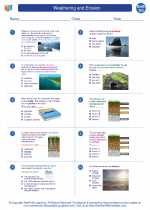Understanding Hysteresis in Earth Science
Hysteresis is a concept that is commonly encountered in the study of Earth Science, particularly in the context of materials and their response to external forces. It refers to the phenomenon where the state of a system depends not only on its current input but also on its history. In other words, the system's response to a stimulus is not just determined by the present conditions, but also by the path it took to reach those conditions.
This concept is particularly relevant in the study of Earth materials and their behavior under varying conditions, such as stress and temperature changes. Understanding hysteresis is crucial in fields such as geology, geophysics, and material science, as it helps in predicting and interpreting the behavior of Earth materials in response to external forces.
Key Concepts:
- System State: The current condition of a system, which is influenced not only by present inputs but also by its past history.
- Input and Output: The relationship between the input (e.g., stress, temperature) applied to a system and the resulting output (e.g., deformation, magnetic properties).
- Looping Behavior: The characteristic pattern observed when the input to a system is varied and then returned to its original value, resulting in a unique path and response due to hysteresis.
Study Guide for Hysteresis in Earth Science:
To gain a comprehensive understanding of hysteresis in Earth Science, it is important to focus on the following key areas:
- Material Behavior: Study the hysteresis loops associated with different Earth materials (e.g., rocks, minerals) under various conditions (e.g., stress, temperature). Understand how the material's history influences its current state and behavior.
- Geophysical Applications: Explore how hysteresis is used in geophysics to interpret the behavior of Earth materials in response to natural forces, such as tectonic stresses and magnetic field variations.
- Experimental Techniques: Learn about experimental methods used to measure and analyze hysteresis in Earth materials, such as stress-strain testing, thermal cycling, and magnetic hysteresis measurements.
- Practical Examples: Investigate real-world examples of hysteresis in Earth Science, such as the behavior of rock formations under changing stress conditions or the magnetic properties of rocks in response to varying magnetic fields.
By mastering these areas, students can develop a deep understanding of hysteresis and its significance in Earth Science, enabling them to interpret and predict the behavior of Earth materials under diverse environmental conditions.
.◂Earth Science Worksheets and Study Guides High School. Weathering and Erosion

 Worksheet/Answer key
Worksheet/Answer key
 Worksheet/Answer key
Worksheet/Answer key
 Vocabulary/Answer key
Vocabulary/Answer key
 Vocabulary/Answer key
Vocabulary/Answer key
 Vocabulary/Answer key
Vocabulary/Answer key
